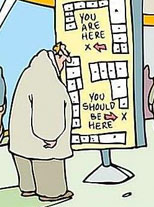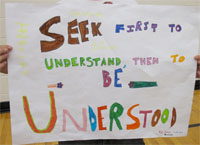 Let’s play a little game. I want you to think of a common tune that we would both know, like Happy Birthday or Jingle Bells. Now play out the rhythm of the song by tapping your finger on the table and see if I can guess the song.
Let’s play a little game. I want you to think of a common tune that we would both know, like Happy Birthday or Jingle Bells. Now play out the rhythm of the song by tapping your finger on the table and see if I can guess the song.
Before we start, make a guess – if we were to do this for 100 very well known songs, how many would I get right? If you were like most you would have said 50 or half of them. If I were like most people in a 1990 study by Stanford researcher Elizabeth Newton, I would only get 3.
Why the big discrepancy? Chip Heath, author of Made To Stick calls this the curse of knowledge.
The best teachers know this well. I would contend that 50% of teacher’s job is being able to explain a concept and the other 50% is truly understanding what it is like to not know it. In other words they are good at knowing their destination and, equally important, they know the student’s starting point.
 That seems logical – if you want to know how to get somewhere you have to know where you are. That’s all good for us individually, but isn’t this really hard when we have to lead someone else to a destination?
That seems logical – if you want to know how to get somewhere you have to know where you are. That’s all good for us individually, but isn’t this really hard when we have to lead someone else to a destination?
Think about a typical day – how many conversations do you have that require you to move someone from one level of understanding to another? Consider all of the emails, hallway conversations, and interactions with your kids. I think 90% of the conversations I have during a day are either me moving someone else or someone else trying to move me. Our day is one big interaction based on influencing each other.
If so much of our day is spent trying to influence each other what skills would we work on to improve ourselves?
 That’s what G. Richard Shell, author of Bargaining for Advantage wanted to know as well. Few are as effective at moving people from one state to another as a professional negotiator, so he asked “What do skilled negotiators do that average negotiators do not?” The simple answer is that skilled negotiators spend 38% of their interaction time with clients asking questions while less skilled ones only utilize 18% of that time. In other words over a third of the time trying to influence someone else was used to find out where they were.
That’s what G. Richard Shell, author of Bargaining for Advantage wanted to know as well. Few are as effective at moving people from one state to another as a professional negotiator, so he asked “What do skilled negotiators do that average negotiators do not?” The simple answer is that skilled negotiators spend 38% of their interaction time with clients asking questions while less skilled ones only utilize 18% of that time. In other words over a third of the time trying to influence someone else was used to find out where they were.
Replay yesterday’s conversations, the 90% where you needed to influence someone. How much of your time was spent explaining rather than asking? Was it 38%?
Mine wasn’t. I need to work on that.
Today’s Question
What are some of the common questions that you ask to better understand someone’s starting point?






